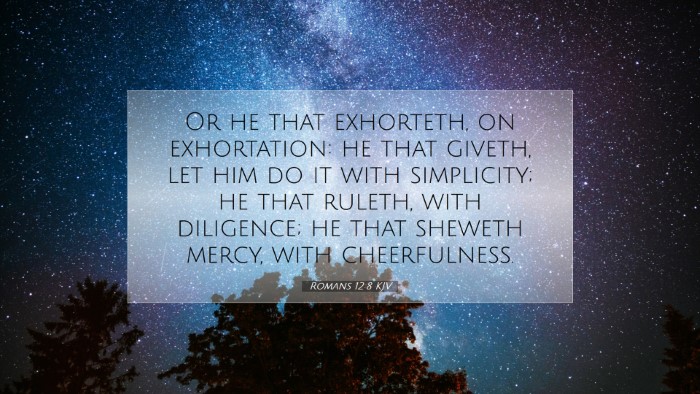Old Testament
Genesis Exodus Leviticus Numbers Deuteronomy Joshua Judges Ruth 1 Samuel 2 Samuel 1 Kings 2 Kings 1 Chronicles 2 Chronicles Ezra Nehemiah Esther Job Psalms Proverbs Ecclesiastes Song of Solomon Isaiah Jeremiah Lamentations Ezekiel Daniel Hosea Joel Amos Obadiah Jonah Micah Nahum Habakkuk Zephaniah Haggai Zechariah MalachiRomans 12:8
Romans 12:8 KJV
Or he that exhorteth, on exhortation: he that giveth, let him do it with simplicity; he that ruleth, with diligence; he that sheweth mercy, with cheerfulness.
Romans 12:8 Bible Commentary
Roman 12:8 Commentary
Verse Interpretation: Romans 12:8 states, "Or he that exhorteth, on exhortation: he that giveth, let him do it with simplicity; he that ruleth, with diligence; he that sheweth mercy, with cheerfulness." This verse is part of a larger section where the Apostle Paul discusses the various gifts within the Body of Christ and the proper demeanor with which they should be exercised.
General Context
The Apostle Paul, in this epistle to the Romans, emphasizes the practical implications of theological truths. Romans 12 serves as a transition from doctrinal exposition to ethical application, encouraging believers to live out their faith in tangible ways. Within this framework, verse 8 highlights specific gifts and the attitudes that should accompany their use.
Insights from Public Domain Commentaries
Matthew Henry
Matthew Henry, in his exhaustive commentary, reflects on the richness of this verse by underscoring the importance of spiritual gifts. He notes that the exhorters must engage with a spirit of encouragement, enhancing the church's life. Henry also emphasizes that the act of giving should be marked by simplicity—not seeking recognition or reward, but motivated purely by love and duty. His insights suggest that diligence in leadership and cheerfulness in mercy reflect a deep understanding of God's grace.
Albert Barnes
Albert Barnes elaborates on the various roles within the church as described in Romans 12:8. He points out that the exhortation involves a stimulating and encouraging influence upon others, highlighting its importance for building up the community of faith. Regarding the act of giving, Barnes explains that when Christians share with others, they should do so freely and generously, with a heart willing to assist those in need. His comments advise that leaders, as mentioned in the verse, are called to be diligent in their responsibilities, which requires a fervent and attentive spirit.
Adam Clarke
Adam Clarke provides a detailed analysis of the terms in this verse, diving into the original language elements. He articulates that “exhorting” transcends merely encouraging; it also involves an urgency and calling for spiritual growth and perseverance. Clarke also explores the necessity for simplicity in giving, advocating for a heart that seeks to bless others without ostentation. His emphasis on cheerfulness in showing mercy brings to light the need for joyfulness in service, suggesting that the attitude of the giver has implications for both the giver and receiver.
Exegesis and Theological Reflection
Romans 12:8 serves as a reminder of the varied yet interdependent roles within the Christian community. Each gift mentioned—as seen through the lens of the various commentaries—is not merely a personal endowment but a communal resource meant to be stewarded wisely.
Exhortation
The role of the exhorter entails not merely instruction but also motivation geared towards action. This aligns with the overall theme of Paul's epistle, which is about living as transformed individuals in community. Exhortation acts as an agent for encouragement, pushing believers towards growth in faith and community engagement.
Giving
Regarding giving, scholars collectively stress the need for humility and a pure motive. To give with simplicity means to act without ulterior motives, reflecting God's generous and unconditionally loving nature. This aligns with Christ’s teachings on giving, where He emphasizes our heart's posture over the act itself.
Leadership
The call for diligence emphasizes accountability and responsibility among leaders. The life of a leader must reflect steadfastness and unwavering support for the community they shepherd. There is a weight of expectation that those who lead must embody the values they teach.
Mercy
In showing mercy, Clarke's emphasis on cheerfulness is poignant, reminding us that our acts of kindness reflect the nature of Christ’s mercy towards us. This highlights not only the act of mercy but the joy that should accompany such actions, underscoring the transformative power of God’s grace in the hearts of believers.
Practical Applications
Leaders, students, and scholars alike can draw significant insights from Romans 12:8 for personal growth and community engagement. The diverse responsibilities within spiritual communities remind us of the necessity for mutual support and accountability.
- For Pastors: Emphasize equipping church members for their specific gifts, promoting a culture of service where every role is valued.
- For Students: Encourage personal exploration of one’s gifts, understanding their potential impact within the broader body of Christ.
- For Theologians: Engage in deeper theological reflection on how diverse gifts function within ecclesiology and the implications for church unity.
- For Bible Scholars: Consider the socio-historical context of early Christian communities and how these gifts played a role in their formation and growth.
Conclusion
Romans 12:8 encapsulates essential truths about the nature of the Christian community and the diversity of gifts within it. By integrating the insights of Henry, Barnes, and Clarke, we gain a comprehensive understanding of the implications of these gifts. As believers strive to fulfill their roles within the Body of Christ, it is crucial to do so with the right attitudes—simplicity, diligence, and cheerfulness—mirroring Christ’s love and grace in all endeavors.


